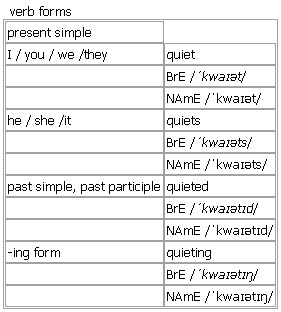 quiet
quiet

quiet [quiet quiets quieted quieting quieter quietest] adjective, noun, verb BrE [ˈkwaɪət] NAmE [ˈkwaɪət]
adjective (quiet·er, quiet·est)
1. making very little noise
•her quiet voice
•a quieter, more efficient engine
• Could you keep the kids quiet while I'm on the phone?
• He went very quiet (= did not say much) so I knew he was upset.
•‘Be quiet,’ said the teacher.
•She crept downstairs (as) quiet as a mouse.
2. without many people or much noise or activity
•a quiet street
• They lead a quiet life.
• Business is usually quieter at this time of year.
•They had a quiet wedding.
•The hotel is in a quiet location near the sea.
3. not disturbed; peaceful
•to have a quiet drink
• I was looking forward to a quiet evening at home.
4. (of a person)tending not to talk very much
• She was quiet and shy.
5. (of a feeling or an attitude)definite but not expressed in an obvious way
• He had an air of quiet authority.
Word Origin:
Middle English (originally as a noun denoting peace as opposed to war): via Old French, based on Latin quies, quiet- ‘repose, quiet’.
Thesaurus:
quiet adj.
1.
•We could hear quiet footsteps outside.
soft • • faint • • inaudible • • hushed • • muffled • |written dull •
Opp: loud
a/an quiet/soft/faint/inaudible/hushed/muffled voice
a/an quiet/soft/faint/inaudible/hushed whisper
a quiet/soft/faint/muffled/dull sound
2.
•They lead a quiet life.
peaceful • • calm • • sleepy • • silent • |written tranquil •
Opp: busy
a quiet/peaceful/sleepy/silent/tranquil place/village/town
a quiet/peaceful/calm/sleepy/tranquil atmosphere
a quiet/peaceful/calm/tranquil day/night/morning/evening
3.
•She was quiet and shy, and rarely spoke in class.
reserved • • shy • • silent • |formal reticent • • taciturn •
a quiet/reserved/shy/silent/reticent person/man
He's the quiet/silent type.
strangely quiet/silent/reticent
Example Bank:
•His voice was dangerously quiet as he asked the question.
•I knew I had to keep quiet about it.
•I was looking forward to a nice quiet afternoon.
•Just sit quiet for a moment, there's a good boy.
•Keep that dog quiet, will you!
•Keep the patient as quiet as possible.
•Lie quiet for an hour and you'll feel better.
•She went back to a strangely quiet house.
•Suddenly the room went all quiet.
•The house was eerily quiet.
•The negotiations were quiet and hurried.
•Things seemed quiet enough, but it was an uneasy calm.
•We'll have to keep this quiet— if it gets out, we'll all be in a lot of trouble.
•‘ Be quiet,’ said the teacher.
•Could you keep the kids quiet while I'm on the phone?
•During the week it's a good place to go for a quiet drink.
•He went very quiet so I knew he was upset.
•How would you like a quieter, more efficient engine?
•I could hardly hear her quiet little voice.
•She crept downstairs (as) quiet as a mouse.
•She was quiet and shy, and never spoke up in class.
•The house was quiet except for the sound of the television.
•We could hear quiet footsteps in the corridor.
Idioms: ↑keep quiet about something ▪ ↑keep something quiet ▪ ↑on the quiet
Derived Words: ↑quietly ▪ ↑quietness
noun uncountable
the state of being calm and without much noise
•the quiet of his own room
•the quiet of the early morning
•I go to the library for a little peace and quiet.
Word Origin:
Middle English (originally as a noun denoting peace as opposed to war): via Old French, based on Latin quies, quiet- ‘repose, quiet’.
Example Bank:
•A machine gun shattered the quiet.
•A man's voice was calling for quiet.
•I'm going home for a bit of peace and quiet!
•She made sure she had times of quiet in which to write.
•a period of comparative quiet
•in the sudden quiet that followed the gunshot
•He seemed to prefer the quiet of his own room.
•I go to the library for a little peace and quiet.
•The quiet of the early morning or evening is a good time to be on the lookout for wildlife.
verb intransitive, transitive (especially NAmE)
to become calmer or less noisy; to make sb/sth calmer or less noisy
Syn: ↑calm down
•~ (down) The demonstrators quieted down when the police arrived.
•~ sb/sth (down) He's very good at quieting the kids.
Verb forms: 
Word Origin:
Middle English (originally as a noun denoting peace as opposed to war): via Old French, based on Latin quies, quiet- ‘repose, quiet’.
Example Bank:
•He's very good at quieting the kids.
|
|
